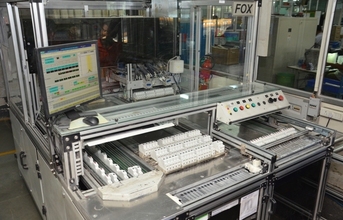
Patidar of Shakti Pumps says that while automation has its merits and demerits in terms of flexibility and agility at workplace, it has to be implemented considering all aspects of work including the work force. He does believe that automation has a great impact on work environment as well. Loss of versatility affects the work environment.
"With repeated and cyclical activities there is pressure on other work and processes to catch up with automated processes implemented. Automation is a great success where large volumes of homogenous products are manufactured compared to industries where less volume homogenous products are manufactured. It has competitive advantage on certain aspects when handling hazardous jobs where robots or automated system operate perfectly," Patidar says.
With today's process plants requiring more rapid changeover capabilities as the lifecycles of the products produced continues to shrink and consumer demand constantly shifts, it is critical to be able to change automation configurations and architectures on the fly, without stopping the process, says Quadros of Schneider Electric India. P+F India's Kantoor says that the current automation solutions impart flexibility of production lines, better energy efficiency, quick scaling resulting in better throughput of the plant and utilization of equipment. "Current manufacturing equipments like PLCs and intelligent sensors provide adaptive solutions by creating a relation between electro-mechanism to software controls of the machine. Virtual commissioning environment can help in redesigning complex intelligent manufacturing systems. Machines can be made future ready with the invasion of automation while sticking to traditional manual operations may hamper production rate and quality." Green with automation With sustainability becoming both a social as well as business requirement, manufacturers today need to incorporate ‘green' elements into their business from design to disposal. What role does industrial automation playing in the green cause? According to Chawla of Legrand India, automation also plays its own role here when it comes to promoting green elements, by avoiding products/ components/processes which are not environment friendly. "Automation makes process energy efficient helping us conserve energy, aiding in efficient waste reduction and disposal, enabling paperless work," he says. "The automation process helps us capture the impact of the green initiatives, monitor these green practices and bring down the operating expenses. It also helps in increasing the overall efficiency and productivity," says Grundfos' Rajkumar. Quadros of Schneider Electric India draws attention to another important factor. He says that with all automation products being ROHS and energy efficient they consume less energy and are environment friendly.
Kulkarni of Siemens believes that energy efficiency is something which can be best achieved by using right automation platform. Metering, collating the energy consumers and making timely and correct reports of the same are impossible without appropriate automation. Also the power consumption by the automation solutions goes unnoticed and it is quite sizable as well. "PROFIienergy is an excellent contrivance that helps to save significant energy just by way of sending un-used automation node/ component in ‘sleep mode' when not in use."
Lauenroth of Volkswagen India agrees that automation definitely helps in eco-friendly and efficient manufacturing. "For example, in our paint shop, we have robots painting the car bodies. Here, due to automation, there is higher transfer efficiency of paints as compared to manual work - thus reducing the amount of paint used. Ultimately, this reduces the VOC emissions. Another example is of sealers where automation reduces material handling and thus saves energy. We have also installed a new system of cleaning skids in our paint shop. With this new automated system, we are saving water and energy for cleaning the skids to a great extent as compared to the traditional method of manual cleaning." Kantoor of P+F India emphasises on the importance of energy efficiency as the key reasons for companies to go green. "New technology in automated systems can control everything from the lighting to AC to make smarter use of energy. Automated dimmer systems can turn on or dim lights depending upon human presence with the help of sensors, helping in increasing life expectancy of bulbs and reduce electricity consumption. Using sensors and other automated solutions instead of manual intervention reduce waste on HVAC expenses. Using smart drives and energy efficient motors reduce idle use of power consumed by them sometimes caused by human error or negligence."
According to Shakti Pumps' Patidar, automation or industrial processes help to attain optimum utilisation of resources and as result waste/scrap generation is reduced. "This has environmental relevance in industrial processes. Reduced water/scrap mitigates efforts of disposal. Hence automation processes in manufacturing industry gains significance with reduced impact on environment." END


























